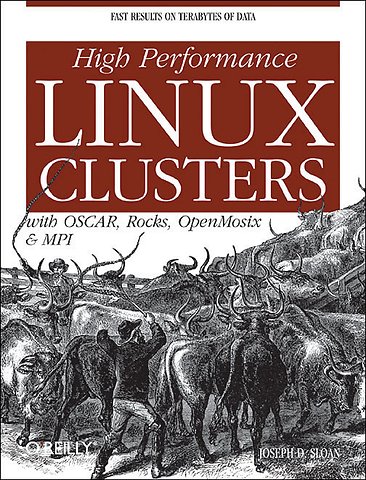High Performance Linux Clusters
With OSCAR, Rocks, openMosix & MPI
Paperback Engels 2005 1e druk 9780596005702Samenvatting
To the outside world, a 'supercomputer' appears to be a single system. In fact, it's a cluster of computers that share a local area network and have the ability to work together on a single problem as a team. Many businesses used to consider supercomputing beyond the reach of their budgets, but new Linux applications have made high-performance clusters more affordable than ever. These days, the promise of low-cost supercomputing is one of the main reasons many businesses choose Linux over other operating systems.
This new guide covers everything a newcomer to clustering will need to plan, build, and deploy a high-performance Linux cluster. The book focuses on clustering for high-performance computation, although much of its information also applies to clustering for high-availability (failover and disaster recovery). The book discusses the key tools you'll need to get started, including good practices to use while exploring the tools and growing a system. You'll learn about planning, hardware choices, bulk installation of Linux on multiple systems, and other basic considerations. Then, you'll learn about software options that can save you hours--or even weeks--of deployment time.
Since a wide variety of options exist in each area of clustering software, the author discusses the pros and cons of the major free software projects and chooses those that are most likely to be helpful to new cluster administrators and programmers.
A few of the projects introduced in the book include:
- MPI, the most popular programming library for clusters. This book offers simple but realistic introductory examples along with some pointers for advanced use.
- OSCAR and Rocks, two comprehensive installation and administrative systems
openMosix (a convenient tool for distributing jobs), Linux kernel extensions that migrate processes transparently for load balancing
- PVFS, one of the parallel filesystems that make clustering I/O easier
- C3, a set of commands for administering multiple systems
Ganglia, OpenPBS, and cloning tools (Kickstart, SIS and G4U) are also covered. The book looks at cluster installation packages (OSCAR & Rocks) and then considers the core packages individually for greater depth or for folks wishing to do a custom installation. Guidelines for debugging, profiling, performance tuning, and managing jobs from multiple users round out this immensely useful book.
Specificaties
Lezersrecensies
Inhoudsopgave
Part I. An Introduction to Clusters
1. Cluster Architecture
Modern Computing and the Role of Clusters
Types of Clusters
Distributed Computing and Clusters
Limitations
My Biases
2. Cluster Planning
Design Steps
Determining Your Cluster's Mission
Architecture and Cluster Software
Cluster Kits
CD-ROM-Based Clusters
Benchmarks
3. Cluster Hardware
Design Decisions
Environment
4. Linux for Clusters
Installing Linux
Configuring Services
Cluster Security
Part II. Getting Started Quickly
5. openMosix
What is openMosix?
How openMosix Works
Selecting an Installation Approach
Installing a Precompiled Kernel
Using openMosix
Recompiling the Kernel
Is openMosix Right for You?
6. OSCAR
Why OSCAR?
What's in OSCAR
Installing OSCAR
Security and OSCAR
Using switcher
Using LAM/MPI with OSCAR
7. Rocks
Installing Rocks
Managing Rocks
Using MPICH with Rocks
Part III. Building Custom Clusters
8. Cloning Systems
Configuring Systems
Automating Installations
Notes for OSCAR and Rocks Users
9. Programming Software
Programming Languages
Selecting a Library
LAM/MPI
MPICH
Other Programming Software
Notes for OSCAR Users
Notes for Rocks Users
10. Management Software
C3
Ganglia
Notes for OSCAR and Rocks Users
11. Scheduling Software
OpenPBS
Notes for OSCAR and Rocks Users
12. Parallel Filesystems
PVFS
Using PVFS
Notes for OSCAR and Rocks Users
Part IV. Cluster Programming
13. Getting Started with MPI
MPI
A Simple Problem
An MPI Solution
I/O with MPI
Broadcast Communications
14. Additional MPI Features
More on Point-to-Point Communication
More on Collective Communication
Managing Communicators
Packaging Data
15. Designing Parallel Programs
Overview
Problem Decomposition
Mapping Tasks to Processors
Other Considerations
16. Debugging Parallel Programs
Debugging and Parallel Programs
Avoiding Problems
Programming Tools
Rereading Code
Tracing with printf
Symbolic Debuggers
Using gdb and ddd with MPI
Notes for OSCAR and Rocks Users
17. Profiling Parallel Programs
Why Profile?
Writing and Optimizing Code
Timing Complete Programs
Timing C Code Segments
Profilers
MPE
Customized MPE Logging
Notes for OSCAR and Rocks Users
Part V. Appendix
References
Books
URLs
Index
Anderen die dit boek kochten, kochten ook
Rubrieken
- advisering
- algemeen management
- coaching en trainen
- communicatie en media
- economie
- financieel management
- inkoop en logistiek
- internet en social media
- it-management / ict
- juridisch
- leiderschap
- marketing
- mens en maatschappij
- non-profit
- ondernemen
- organisatiekunde
- personal finance
- personeelsmanagement
- persoonlijke effectiviteit
- projectmanagement
- psychologie
- reclame en verkoop
- strategisch management
- verandermanagement
- werk en loopbaan







